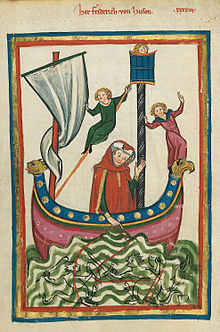Friedrich von Hausen

Friedrich von Hausen (
Minnesingers
; born sometime between 1150–60; d. 6 May 1190.
Life
His name is mentioned frequently in legal documents, for the first time in one from
Worms in the company of Baldwin V, Count of Hainaut. He accompanied the Emperor Frederick, by whom he was held in high esteem, on the Third Crusade in 1189, and met his death at the battle of Philomelium (modern-day Akşehir, Turkey
), when he fell with his horse while pursuing the enemy. The whole army is said to have mourned his death.
Songs
Friedrich von Hausen is one of the earliest of the minnesingers who are known to have imitated French models, with which he became acquainted on his travels through
Burgundy and Provence. Together with Heinrich von Veldeke he introduced the Romance element into the minnesong. The Provençal influence is especially evident in the dactylic rhythm of his verses, which resulted from the adoption into German of a Romance ten-syllable line with four or five stresses. His rhymes are still occasionally imperfect and his songs contain more than one strophe. Hausen's poetry is rather artificial in form and often abstruse in spirit. He is fond of dallying with a word. Like most of the troubadours or minnesingers he sings chiefly of troubled love. He directly influenced Bernger von Horheim
.
Editions
- Friedrich von Hausen, Lieder. Mittelhochdeutsch/Neuhochdeutch. Text, translation and commentary by Günther Schweikle (ISBN 3-15-008023-1
- Lachmann, Karl; Haupt, Moritz; Vogt, Friedrich, eds. (1888). "VII: Her Friderich von Husen". Des Minnesangs Frühling (4 ed.). Leipzig: Hirzel. pp. 42-55. Retrieved 7 February 2016.
- Moser, Hugo; Tervooren, Helmut, eds. (1988). "X: Friedrich von Hausen". Des Minnesangs Frühling. Vol. I: Texts (38 ed.). Stuttgart: Hirzel. pp. 73–96. ISBN 3777604488.
- Mowatt, D.G. (1971). Friderich von Hûsen. Introduction, Text, Commentary and Glossary. Cambridge: ISBN 0-521-07888-1.
Notes
- Schweikle G (1989). "Friedrich von Hausen". In Ruh K, Keil G, Schröder W (eds.). ISBN 978-3-11-022248-7.
![]() This article incorporates text from a publication now in the public domain: Herbermann, Charles, ed. (1913). "Friedrich von Hausen". Catholic Encyclopedia. New York: Robert Appleton Company.
This article incorporates text from a publication now in the public domain: Herbermann, Charles, ed. (1913). "Friedrich von Hausen". Catholic Encyclopedia. New York: Robert Appleton Company.
Further reading
- Jungbluth, Günther; Aarburg, Ursula (1961), "Friedrich von Hausen (Husen)", Neue Deutsche Biographie (in German), vol. 5, Berlin: Duncker & Humblot, p. 599
{{citation}}: CS1 maint: multiple names: authors list (link); (full text online)
